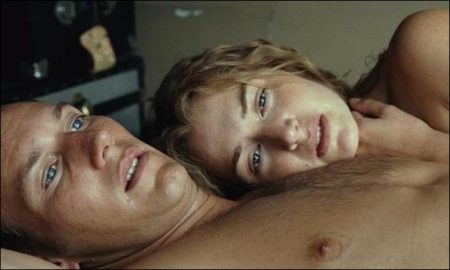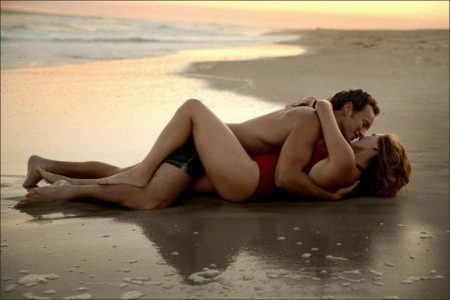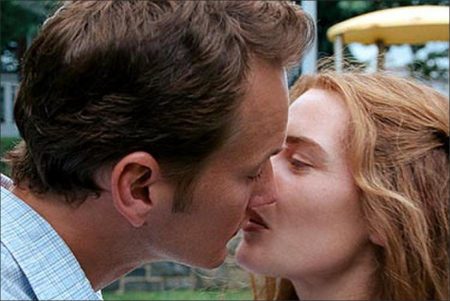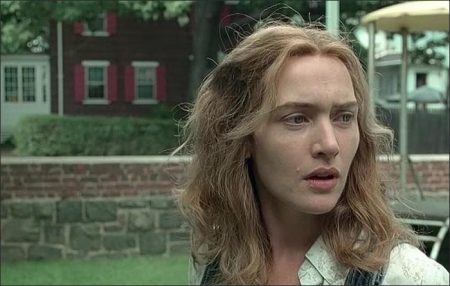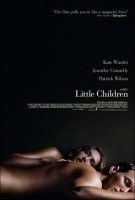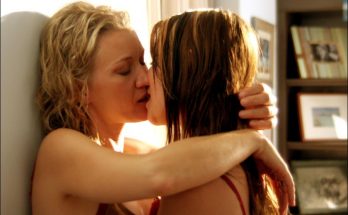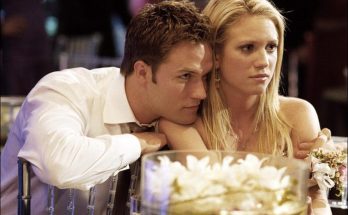Little Children is Todd Field’s superb film adaptation of the novel by Tom Perrotta, begins in a clean and leafy suburban playground, where toddlers cavort under the watchful, benevolent gazes of their pretty young mothers. This may strike you as a rare tableau of innocence in a hectic world, unless, that is, you have spent time in such a place. For the playground really is a scene of primordial brutality, in which a few agreed-upon rules — play nice, share your toys, no hitting — barely suppress the essential savagery of the human species.
I’m not talking about the kids; they’re perfectly sweet. “Little Children,” its title notwithstanding, is a rigorous study of adult behavior, and the first playground scene, introduced by an unseen narrator whose smooth, authoritative voice is familiar from luxury-car commercials, sets a tone that is both compassionate and severe.
It can be observed that the chorus of viciously competitive moms, who reappear now and then throughout the movie to pass judgment and enforce social norms, amounts to a caricature, tinged with snobbery and misogyny. True enough, but those mean mothers nonetheless offer a glimpse into the larger reality that is one of the film’s main areas of inquiry, as it was the novel’s: the empty, invidious, anxious feelings that accompany material and domestic fulfillment.
Set in a Massachusetts suburb with many scenes filmed on location in New York, “Little Children,” which will be shown this weekend at the New York Film Festival before opening in New York and Los Angeles next Friday, balances tenderness with satire. It takes seriously the complaints of people whose lives are, by any objective historical measure, almost impossibly privileged (though they would no doubt describe themselves as middle class). But the movie, which Mr. Field and Mr. Perrotta wrote together, does not, in the manner of other, more facile examinations of suburban dysfunction (like “American Beauty”) assume that it or its audience is better than its characters. The combination of self-regard and anxiety that the characters display makes such judgment superfluous in any case.
Sarah Pierce (Kate Winslet), sitting in that maternal playground klatch, insists to herself (in the narrator’s voice, an unsettling and effective touch) that while she may be in this world, she is not of it: “a researcher studying the behavior of typical suburban women, not a typical suburban woman.” Sarah has been to graduate school, and though she never received a doctorate, she did acquire the habit of living within the protective quotation marks that the postmodern academy hands out in addition to (and sometimes in lieu of) substantive knowledge.
Her bouts of parental ineptness — forgetting to bring a snack to the park for her daughter, Lucy, for example — are both humiliating and self-aggrandizing. Sarah’s sloppiness is a sign, to herself and the others, that she is too fine a creature to be bothered with the trivia of parenthood. Ms. Winslet, as fine an actress as any working in movies today, registers every flicker of Sarah’s pride, self-doubt and desire, inspiring a mixture of recognition, pity and concern that amounts, by the end of the movie, to something like love.
That Ms. Winslet is so lovable makes the deficit of love in Sarah’s life all the more painful. She is married to an older man named Richard (Gregg Edelman), whose profession is marketing and whose vocation is masturbating to Internet pornography, pursuits that leave him with little time for his family. Sarah, suffering from a vague but nonetheless acute malaise, treats it with the traditional literary prescription of adultery, embarking on an affair with Brad Adamson (Patrick Wilson), the only weekday dad at the playground, a handsome former athlete known to the chattering moms as “the Prom King.”
Their first kiss is a joke meant to shock the other moms, but it shocks Brad and Sarah as well, and their discomfort signals that we are not in the swinging suburbia of novels like “Couples” or “The Ice Storm,” but rather in a milieu in which marital infidelity carries the dangerous, thrilling charge of genuine transgression. It comes as no surprise, then, that when Sarah joins a book club the text under discussion is “Madame Bovary.” Nor is it surprising that she identifies with Flaubert’s heroine, who suffered so memorably from the stultification of a provincial marriage that she became a French verb.
In 21st-century America, though, it is not only women who Bovarize; Brad too is bored and adrift. He is married to Kathy (Jennifer Connelly), a documentary filmmaker, and has an easy rapport with their son, Aaron, whom Brad cares for while Kathy is at work. But even if society, in principle, smiles on stay-at-home dads, in practice matters are more complicated.
Aaron still favors his mother, and Brad, who has failed the bar exam twice, is under pressure to climb back on the professional treadmill. He joins a nighttime touch-football league to recapture the vanished athletic glory of his youth, and also to shore up his eroded sense of manhood.
Mr. Wilson’s most striking characteristic in his film roles so far (notably in “The Phantom of the Opera” and “Angels in America”) has been an appealing blankness, which he and Mr. Field have the wit to acknowledge and to subvert. Brad is so obviously blessed by nature and circumstances that he seems, to the playground moms and also in some ways to Sarah, almost unreal, which has the effect of increasing his isolation.
How could anyone feel sorry for this guy, or believe that his inner life was speckled with unhappiness, or even imagine that he has an inner life? You feel sympathy for Brad precisely because it’s impossible to feel truly sorry for him.
Brad and Sarah spend sun-kissed days together at the public swimming pool, their children providing camouflage and, at nap time, the chance for a daily hour or so of sexual bliss. Antonio Calvache, the director of photography, gives the daylight a soft, golden quality that is flattering to Ms. Winslet (whose body the narrator describes as “boyish,” thus demonstrating the limits of his omniscience) and that combines with Mr. Field’s leisurely takes and off-center close-ups to produce a gentle, pastoral rhythm. When night falls, though, that same deliberate pace becomes more sinister, as the town discloses its darker side.
A pedophile named Ronnie McGorvey (Jackie Earle Haley) has been released from prison into his mother’s custody, an event that sets his fellow citizens on edge and that provides the film with a sad, creepy second plot to counterpoint the tale of Brad and Sarah. One of Brad’s teammates, Larry (Noah Emmerich) is obsessed with Ronnie, and sets about harassing the man in the name of public safety: staking out his house, papering tree trunks and lampposts with fliers, banging on his door in the middle of the night.
Larry and Ronnie are, in an odd way, as deeply connected as Brad and Sarah: they are symbols of failure, frustration and the ineradicable consequences of what earlier Massachusetts townspeople would not have hesitated to call sin. Mr. Haley’s performance, haunting and disturbing, is sure to help resurrect his career, and Mr. Emmerich’s is equally impressive. Both actors take thoroughly unsympathetic characters and, without sentimentalizing them or softening their edges, make them into human beings.
Mr. Field, with his second feature — his directing debut was “In the Bedroom” — proves to be among the most literary of American filmmakers, one of the few who tries to find a visual language suited to the ambiguous plainness of contemporary realist fiction. He and Mr. Perrotta have wisely trimmed and modified the book, excising some of its harsher gothic notes and its wilder comic flights. The result is a movie that is challenging, accessible and hard to stop thinking about.
At one point Brad tells Sarah that beauty is overrated, something that, as the narrator notes, only someone secure in his own beauty would say. He may nonetheless be right. But in too many recent movies intelligence is woefully undervalued, and it is this quality — even more than its considerable beauty — that distinguishes “Little Children” from its peers.
Little Children (2006)
Directed by: Todd Field
Starring: Jennifer Connelly, Noah Emmerich, Jackie Earle Haley, Patrick Wilson, Kate Winslet, Gregg Edelman, Sarah Buxton, Jane Adams, Sadie Goldstein, Helen Carey, Trini Alvarado, Marsha Dietlein
Screenplay by: Todd Field, Tom Perrotta
Production Design by: David Gropman
Cinematography by: Antonio Calvache
Film Editing by: Leo Trombetta
Costume Design by: Melissa Economy
Set Decoration by: Susan Bode
Art Direction by: John Kasarda
Music by: Thomas Newman
MPAA Rating: R for strong sexuality and nudity, language and disturbing content.
Distributed by: New Line Cinema
Release Date: October 6, 2006
Views: 374
